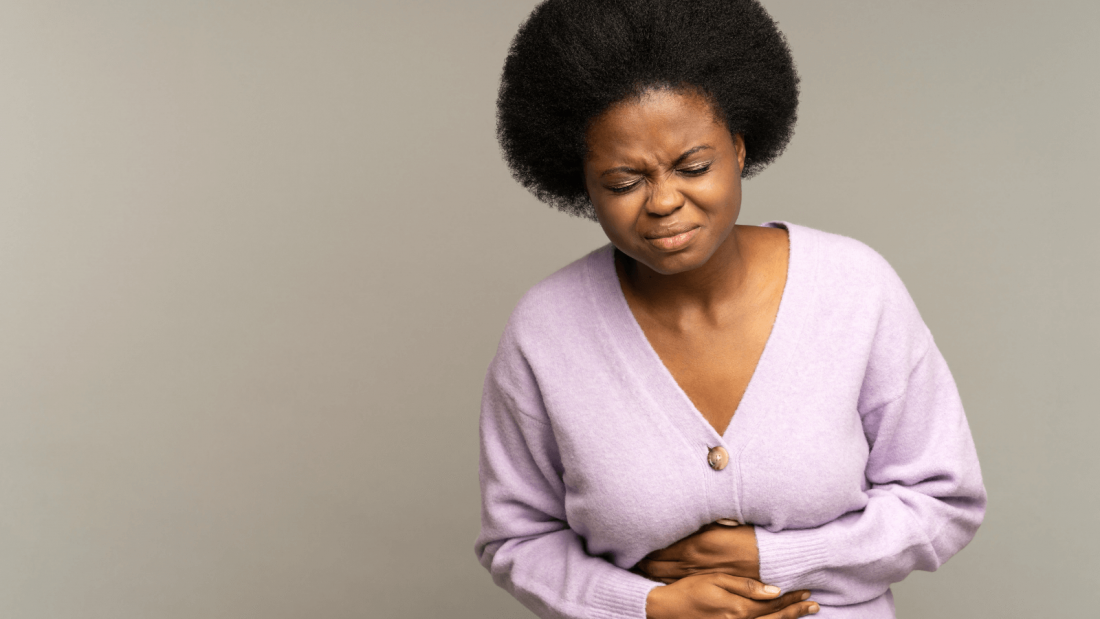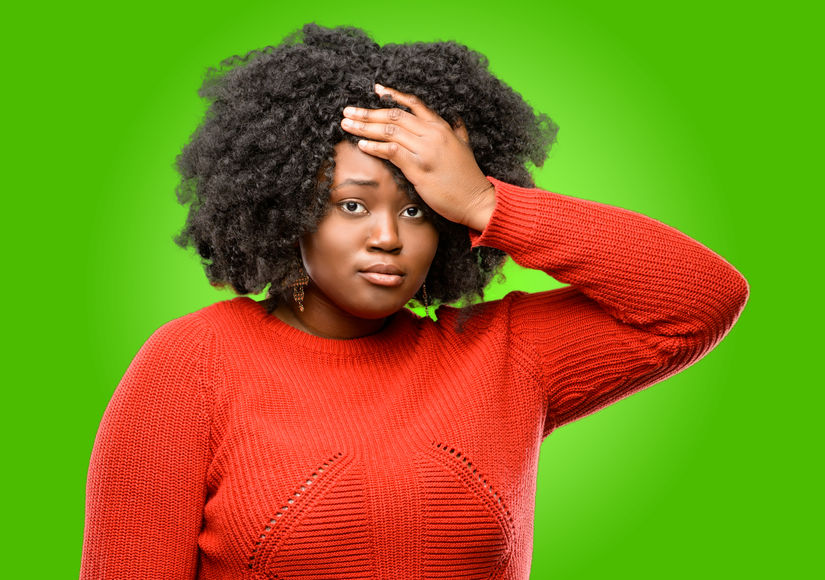Women who suffer moderate to severe fibroids will soon have a new treatment in the form of an oral tablet.
In new final draft guidelines from NICE (National Institute for Health and Care Excellence) “around 4,500 women with uterine fibroids will be eligible for a new oral treatment”.
Uterine fibroids are a non-cancerous growth that occur in or around the uterus. According to the NHS, fibroids are common, with around one in three women developing them at some point in their life. They most often occur in women aged 30 to 50.
Let’s talk about fibroids…
Research shows that roughly three times as many Black women than white women are diagnosed with fibroids, and we suffer more severe symptoms.
Symptoms can include prolonged heavy menstrual bleeding, pelvic pain and pressure, and fertility problems. It is recognised that fibroids usually shrink after the menopause.

While the exact cause of fibroids is unknown, they have been linked to oestrogen. While long-term treatment options have been limited in the past, the ones that are available include “hormonal contraception and non-steroidal anti-inflammatory drugs and for moderate to severe symptoms, injectable gonadotrophin-releasing hormone (GnRH) agonists are often used before surgical options” are explored.
NICE has recommended relugolix with estradiol and norethisterone acetate (also known as Ryeqo and made by Gedeon Ritcher UK) to be taken once a day as a single tablet. This new oral tablet treatment will likely be welcomed by fibroids sufferers as a simple new way to manage their moderate to severe symptoms. The tablet works by reducing the release of hormones which control oestrogen and progesterone production by the ovaries.
10 common Gynae questions about your lady parts answered by an expert!
A spokesperson for NICE said: “Uterine fibroids can have a profound effect on quality of life. Along with the many debilitating symptoms, there is a real lack of long-term options.
“This treatment has the potential to improve quality of life. As well as effectively reducing symptoms, it can be taken at home and is therefore more convenient than the injectable treatment, given in a hospital setting.
“It can also be used long term, which could mean improved and sustained symptom relief, it is well-tolerated, and it will mean thousands of women can avoid invasive surgery which always carries some risk.”
When it comes to fibroids, are we being a little too hasty by opting for surgery?

Elizabeth Joses, a 44-year-old project manager, who has multiple fibroids, welcomes the news of this new simpler alternative for fibroids sufferers.
Elizabeth’s story with fibroids began when she had to deal with extremely heavy bleeding every month while on her period throughout school. “There were times when I would have to just come home from school because the period pains were unbearable. I was put on a contraceptive to try to minimize the pain but the hormones from the pills appeared to be aggravating the fibroids, so that that didn’t work.”
After years of struggling to manage the pains, she was eventually sent to have a scan around 2002 or 2003 and it was confirmed that she had fibroids.
“I finally managed to get a hospital appointment to go and have them surgically removed, as they were still causing me severe symptoms, then I found out I was pregnant.”
The fibroids were present throughout her pregnancy as she explains.
“Sometimes fibroids tend to grow as the baby grows, so the medical teams were aware of my fibroids throughout, obviously from the scans, they were checking the growth of the fibroids as well as the growth of my baby!”
Elizabeth has lived with her fibroids for the best part of 20 years, and they continue to have a huge impact on her life even though she had them surgically removed in 2011, “I had a myomectomy over a decade ago. At the time they said it could grow back and they have indeed grown back.”

“So today, in my mid-forties, the fibroids affect my quality of life, from what I can eat, and what I can drink…because they have once again grown.” A recent scan showed that her scans are quite significant in size and there are a few of them and unfortunately, they are pushing on her bladder.
“One of the fibroids is sitting on top of my bladder, so when I drink just a little bit of water, and obviously to keep hydrated is important, I’m trying to drink as much as I can…to drink my two litres, it’s causing me to urinate and pee almost every 10-15 minutes. That in itself is debilitating, if I want to go out…I have to limit my water intake, to prevent me from having to pee constantly all the time when I’m outside.”
“When it comes to food and my diet as well, because of the mass of the growth in there, obviously my digestive system is going to be affected. I now can’t tolerate certain foods because my stomach would just bulge and bloat excessively, it causes constipation, wind, bloating.”
At times the struggle with dealing with her fibroids cannot even be a personal issue as their growth, coupled with excessive bloating caused her stomach to balloon in size to the point where she looked pregnant.
“I’m watchful of what I eat now because I can’t have things that trigger a bloat, and then there’s also the periods and all of that. You know I like food, I’m a foodie person but I’ve had to really reduce my portions, I’ve had to cut out lots of food that causes bloating.”
Unsurprisingly, Elizabeth is very critical of the support she has had and the treatment options available so far.
“It’s been long winded and complicated. There has been a lack of communication and I’m yet to sit in front of a gynaecologist to look at what options are available to me. Because I’ve had surgery to remove my fibroids before, I don’t want to go down the surgical route this time.”
Elizabeth welcomes the news of a simple oral treatment to treat her symptoms.
When it comes to fibroids, are we being a little too hasty by opting for surgery?
“This is exactly what I’m looking for. I want something that will reduce the impact of the fibroids on my life. If there’s a treatment that will be non-surgical, non-invasive, that will help those symptoms…I’m all for it. Because I’ve done the surgical thing, I don’t want to go down that route again, and because of my age, I’m near menopause now, I understand that they do tend to shrink in size when you reach menopause stage… so I don’t want to have to go through the whole thing of doing surgery when I’m just about to be going into menopause.
“If there is an option to reduce the impact, reduce the symptoms…I wholeheartedly welcome that, I can’t wait to discuss this with my gynaecologist.”
NICE suggests that Relugolix with estradiol and norethisterone acetate for treating uterine fibroids will be available three months after the final guidance is published.













1 comment
As soon as I saw this being advertised as a ‘miracle’ drug, I knew there would be women who would see this as ‘the’ solution to their suffering. I get why any woman would want relief from the symptoms that accompany fibroids, but what tends to be over looked is the long term side effects. Any medication that may cause cancer, damage fertility or damage the unborn child needs serious time out to think.
Further, the hormone contained within the pill is Estradiol, a synthetic form of the hormone that is naturally produced in the body. Its in the form of hemihydrate. Hemihydrate is a binder used in the construction industry, usually known as plaster of Paris. Any pill where
As far as I can tell, this pill has only been tested on animals, although I’ll need more info on this to be sure. The female body is very different to female rats and will not react the same to the medication.
I always worry greatly when I cannot find the ingredients to medication geared towards women who have fibroids or any other gynaecological condition for that matter. It may relive symptoms so you can get on with life, but what we do not know is the long term damage it will have on the body in the long term.
Any drug that gives you first aid measures such move to fresh air if inhaled or in case of skin contact wash with soap and water for me is very concerning. If you look at the safety data that tells you the ingredients ‘may be combustible’ at high temperatures, you’ve got to get your brain into gear and ask yourself some important questions: do I really want to be ingesting a pill that is made from the same material used in the construction industry, that may affect my fertility or unborn child, has been tested on rats, is potentially combustible, may cause long term internal damage…just so I can get some relief? Not to mention that it doesn’t actually cure the problem, only suppresses symptoms.
Its vital women start looking at less toxic ways to deal with fibroids and associated symptoms. You have to be willing to do something different rather than rely on quick fix miracle drugs that may cause more harm further down the line. Nature has provided us with all the remedies we need. Only if we would just listen to and trust our bodies more.